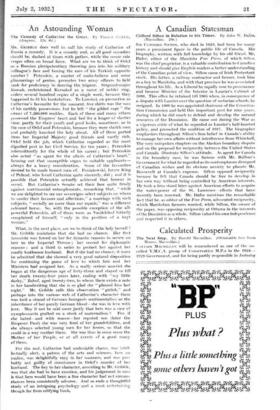An Astounding Woman
The Comedy of Catherine' the Great. By Francis Gribble. ((.rayson. 12s. 6d.) GRIBBLE does well to call his study , of Catherine of Russia a comedy. It is a comedy and, as all good comedies should be, dashed at times with pathos, while the comic side verges often on broad .farce. What are we to think of Orlof as a Russian plenipotentiary throwing jam into his military .colleague's face and boxing the ears of his Turkish opposite number? Potemkin, a master .or make-believe and some glimmerings of genius, promotes two army officers to field . rank for proficiency in dancing the tzigane. , Sergeant-major Kersak, , rechristened Korsakof as .a name ..of nobler ring, orders. several hundred copies of a single work, because they happened to fit his bookshelves. To tanskoi, on promotion as Catherine's favourite for the moment, five shirts was the sum of his earthly possessions, but he left " the gilded cage" the owner of 7,260,000 roubles. Each of these and many others possessed the Empress' heart and bed for a longer or shorter time, partly for their youth and good looks, sometimes, as in the case of Orlof and Potemkin, because they were sheikh men and probably knocked the lady about. All of them parted from her Imperial Majesty good friends and vastly rich. Orlof held the job, which Catherine regarded as the most dignified post in her Civil Service, for ten years ; Potemkin intermittently for the whole of his career ; but Potemkin also acted "as agent for the affairs of Catherine's heart," farming out that susceptible organ to suitable applicants— always for a heavy consideration. Some of the favourites desired to be made honest men of. Poniatowski, future King of Poland, who loved Catherine quite sincerely, did ; and it is possible that Potemkin actually achieved that honour in secret. But Catherine's Senate set their face quite firmly against matrimonial entanglements, remarking that, "while we are delighted to see our sovereigns select subjects on whom to Confer their favours and affections," a marriage with such subjects, "socially no more than our equals," was a different coloured horse. So, with the possible exception of the all- powerful Potemkin, all of them were. as Vasilchikof bitterly complained of himself, "only in the position of a kept woman."
What, in the next place, are we to think of the lady herself ? Mr. Gribble maintains that she had no chance. Her first favourite was forced on her for dynastic reasons to secure an heir to the Imperial Throne ; her second for diplomatic reasons ; and a third in order to protect her against her madly loathsome husband. But if she had no chance, it must be admitted that she showed a very good natural disposition for continuing. the 'game of love to which fate and her Ministers had assigned her. As a really serious amorist she began at the dangerous- age of forty-three and stayed so till her death twenty-four years later, ending with " my little darky," Zubof, aged twenty-two, to whom there exists a note in her handwriting that she is so glad she "pleased him last night." . Mr. Gribble calls this observation "girlish," and perhaps into the various web, of Catherine's character there was knit a strand of German bourgeois sentimentalism as the inheritance of her purely German blood—she was in love with Jove. May 'it not be said more justly that hers was a case of nymphomania grafted on a stock or maternalism ? For, if she hated—and with reason—her reputed son (later the Emperor Paul) she was very fond of her grandchildren, and she always selected young men for her lovers, so that she .could in a. way mother them. She was thus in some sense the Mother of her. People, or at all events of a good many of them.
For the rest, Catherine had undeniable charm, was intel- lectually alert, a patron Of the arts and sciences, bore no malice, was delightfully' ea's3; in her Manners, and was pro- bably not guilty of connivance in Orlors murder of her husband. The key to her. character, according to Mr. Gribble, was that she had to have emotion, and his judgement in sum is that hers would have been a fine character had not circum- stances been consistently adverse. And so ends a thoughtful study of. an intriguing' psychology and a most entertaining though-far from edifying book.






































 Previous page
Previous page